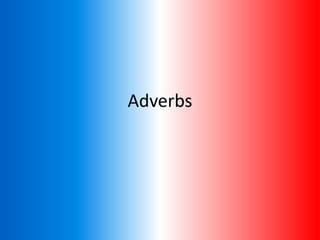More Related Content
What's hot
What's hot (17)
Similar to Adverbs
Similar to Adverbs (10)
Spoken English Beginner Session 16 - Gerunds & Infinitive - Ash Vyas

Spoken English Beginner Session 16 - Gerunds & Infinitive - Ash Vyas
French Adjectives - Adjectifs. All about French adjectives

French Adjectives - Adjectifs. All about French adjectives
More from kerrie1996
More from kerrie1996 (20)
Adverbs
- 1. Adverbs
- 2. Adverbs are words used to describe a verb, an adjective or another adverb. They can be divided into four groups: • How something happens • Where something happens • When something happens • To what extent
- 3. Formation of adverbs In English, most adverbs are made from an adjective + LY. To form French adverbs you start with the adjective and add MENT: • To the masculine singular form of the adjective if it ends in a vowel: Vrai Vraiment • To the feminine singular form of the adjective if it ends in a consonant: Malheureux Malheureusement
- 4. Formation of adverbs Exceptions: • Some adverbs have an extra accent compared to the original adjective. Énorme énormément • ENT/ANT EMMENT/AMMENT Brillant brillamment
- 5. Common irregular adverbs: • Très - Very • Assez - Rather/fairly • Trop - Too • Beaucoup - A lot • Vite - Quickly • Bien - Well • Mal - Badly • Même - Even • Tout - All/quite/completely • Peu - Little/not much • Encore - Again
- 6. Position of adverbs • Adverbs usually follow the verb: Je regarde beaucoup la télé. • Adverbs often come before the adjective or another adverb: Elle est très sympa. Nous les adorons vraiment beaucoup. • In a compound tense, adverbs come between the auxiliary and the past participle: Il s’est souvent réveillé à bonne heure. • Many verbs of time and place follow the past participle: J’ai vu ma tante hier.
